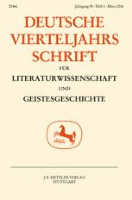
DEUTSCHE VIERTELJAHRSSCHRIFT FUR LITERATURWISSENSCHAFT UND GEISTESGESCHICHTE
metrics 2024
Advancing Discourse in Literature and Cultural Studies.
Introduction
DEUTSCHE VIERTELJAHRSSCHRIFT FUR LITERATURWISSENSCHAFT UND GEISTESGESCHICHTE, published by J B METZLER, is a distinguished academic journal hailing from Germany that offers a profound exploration of literature, cultural studies, and philosophy. With its ISSN 0012-0936 and E-ISSN 2365-9521, this journal has been operational since its inception in 1973, continually contributing to the intellectual discourse surrounding literary and philosophical theories. The journal holds a recognized position within the academic landscape, achieving a Q3 ranking in Literature and Literary Theory and Q4 in both Cultural Studies and Philosophy as of 2023. Although it does not currently offer Open Access options, its impact in the field is underscored by its ranking in Scopus, where it is recognized amongst a competitive cohort of journals. Aimed at researchers, professionals, and students alike, the DEUTSCHE VIERTELJAHRSSCHRIFT serves as an invaluable resource for those investigating the intersections of literature and the broader cultural milieu, fostering an understanding of the dynamics that shape literary and philosophical thought.
Metrics 2024
 0.11
0.11 0.40
0.40 0.30
0.30 8
8Metrics History
Rank 2024
Scopus
JCI (Web Of Science)
Quartile History
Similar Journals

MERKUR-DEUTSCHE ZEITSCHRIFT FUR EUROPAISCHES DENKEN
Engaging with the Rich Tapestry of European CultureMERKUR-DEUTSCHE ZEITSCHRIFT FUR EUROPAISCHES DENKEN is a prestigious journal published by Klett-Cotta Verlag, dedicated to the exploration of European thought, culture, and intellectual discourse. With an ISSN of 0026-0096, this journal provides a platform for critical analysis and reflection on a wide array of topics within the fields of Arts and Humanities, Cultural Studies, and Sociology. Although coverage in Scopus was discontinued in 2014, MERKUR maintains a significant historical footprint, having previously ranked #76 in Arts and Humanities and #519 in Cultural Studies. This underscores its role in contributing to scholarly conversations regarding European intellectual traditions. The journal, located at Rotebühlstraße 77, D-7004 9 Stuttgart 1, Germany, while not open access, remains an essential resource for researchers, professionals, and students alike, keen on examining the contours of European thinking and its implications in contemporary society.

CLIO-A JOURNAL OF LITERATURE HISTORY AND THE PHILOSOPHY OF HISTORY
Unraveling the Tapestry of History and LiteratureCLIO: A Journal of Literature, History, and the Philosophy of History, published by Indiana University-Purdue University, serves as a pivotal platform for scholars and students alike. Since its inception, this journal has offered a unique convergence of literary analysis, historical context, and philosophical inquiry, creating a rich dialogue across disciplines. With an ISSN of 0884-2043, CLIO has evolved alongside the academic landscape from its early days in the late 20th century, reflecting the changing paradigms of literature, history, and philosophical thought. Although currently categorized in the Q4 quartile across its three relevant fields—History, Literature and Literary Theory, and Philosophy—it continues to invite contributions that challenge traditional boundaries and foster interdisciplinary research. While not currently an Open Access journal, CLIO remains an essential resource for those invested in the critical exploration of historical narratives and literary expressions, appealing to all who seek to understand the intricate weave between past and present.

SINN UND FORM
Engaging Minds through Intellectual ExplorationSINN UND FORM is a distinguished academic journal, exploring the intricate intersections of Cultural Studies, Literature, Literary Theory, Philosophy, and Religious Studies. Published in Germany by SINN UND FORM, this journal provides a crucial platform for scholars and practitioners to disseminate and debate innovative ideas and research findings. Even though it currently holds a Q4 quartile ranking across several categories, the journal continues to uphold a commitment to fostering critical dialogue within its fields. Located at C/O AUFBLAU-VERLAG GMBH in Berlin, SINN UND FORM has been a key resource for academic inquiry since its inception. The scope of the journal reflects a rich heritage of intellectual exploration, and while it does not offer open access options, it remains an important repository of thoughtful engagement with contemporary cultural and philosophical issues. With the ever-evolving landscape of humanities scholarship, this journal is poised to attract the attention of researchers, students, and professionals seeking to enrich their understanding and provoke meaningful discussions.

POETICA-ZEITSCHRIFT FUR SPRACH-UND LITERATURWISSENSCHAFT
Advancing Scholarly Research in Language and LiteraturePOETICA-ZEITSCHRIFT FUR SPRACH-UND LITERATURWISSENSCHAFT is a pivotal journal published by Brill, focusing on the fields of linguistics and literary studies. Founded in Germany, this esteemed publication showcases rigorous scholarly research, fostering a deeper understanding of language and literature. Although the journal does not currently operate as an open-access platform, it remains an essential resource for academics in these areas, featuring innovative studies that span from 2002, through selected years, to 2024. With a Q4 category in Linguistics and Language and a Q3 in Literature and Literary Theory as of 2023, POETICA ranks among the significant contributors to the arts and humanities discourse. It provides a vital forum for researchers and students to engage with contemporary debates and methodologies, ensuring its relevance and importance in the academic community.
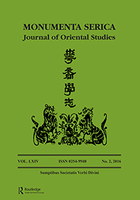
Monumenta Serica-Journal of Oriental Studies
Cultivating Academic Excellence in Oriental StudiesMonumenta Serica - Journal of Oriental Studies is a prestigious publication dedicated to advancing knowledge in the fields of cultural studies, history, literature and literary theory, philosophy, and religious studies. Published by Routledge Journals, Taylor & Francis Ltd, this journal boasts an impressive distribution since its inception in 1948, providing a rich repository of scholarly articles that explore the multifaceted dimensions of Oriental studies. Recognized in the Q1 and Q2 quartiles across various categories and exhibiting commendable rankings in Scopus for arts and humanities, the journal continues to serve as a critical platform for researchers, professionals, and students. While it is not open access, the journal maintains high standards of academic rigor and fosters intellectual discourse, ensuring its relevance and impact in an ever-evolving academic landscape. With contributions from leading experts, Monumenta Serica aims to bridge cultural complexities and enhance the understanding of Oriental studies through rigorous research and academic dialogue.
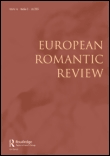
European Romantic Review
Illuminating the Legacy of Romantic LiteratureEuropean Romantic Review is a distinguished journal published by Routledge Journals, Taylor & Francis Ltd, focusing on the critical exploration of Romantic literature and its cultural impact. Since its inception in 1990, the journal has been a vital platform for scholarly discourse in the fields of Cultural Studies and Literature and Literary Theory, with an esteemed ranking in the 61st percentile for its contributions to the literature domain. Despite not being open access, European Romantic Review provides valuable insights to researchers, offering a rich repository of articles that engage with the complexities of Romantic thought, authorship, and aesthetics. The journal's commitment to advancing academic knowledge makes it an essential read for scholars, professionals, and students interested in the nuances of the Romantic era and its lasting influence on contemporary discourse.
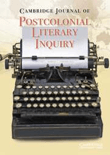
Cambridge Journal of Postcolonial Literary Inquiry
Exploring the narratives of identity and resistance.Welcome to the Cambridge Journal of Postcolonial Literary Inquiry, a leading academic journal published by Cambridge University Press, dedicated to exploring the intricate intersections of postcolonial studies, literature, and history. With its ISSN 2052-2614 and E-ISSN 2052-2622, this journal has emerged as a vital resource for researchers, professionals, and students interested in the evolving narratives and theoretical frameworks shaped by postcolonial contexts. Operating since 2014 and spanning until 2024, it holds a commendable position in the academic community, reflected in its Scopus rankings, including a 76th percentile in Literature and Literary Theory. While the journal does not provide open access options at this time, it offers comprehensive insights that contribute significantly to the discourse surrounding cultural studies and historical perspectives. With categories in the Q3 and Q2 quartiles for Cultural Studies and Literature, it remains a crucial space for innovative scholarship, fostering intellectual engagement with the themes of identity, power, and resistance represented in postcolonial literature.

Literature Compass
Unraveling the Complexities of Text and ContextLiterature Compass, published by WILEY, is an esteemed journal in the field of Literature and Cultural Studies, reflecting a robust commitment to advancing scholarly discourse since its inception in 2004. With an impressive Q1 ranking in Literature and Literary Theory and a Q2 ranking in Cultural Studies as of 2023, the journal stands out as a critical resource for researchers, professionals, and students alike, offering insights into contemporary literary analysis and cultural critique. While not operating as an open access journal, it provides a wealth of peer-reviewed articles that delve into the complexities of literature and its societal implications. The journal’s unique aim is to bridge diverse literary topics, facilitating a holistic understanding of narrative forms and their cultural contexts. As part of a prestigious academic tradition, Literature Compass is published from the United Kingdom and serves as a vital platform for intellectual exchange in an increasingly interconnected world.
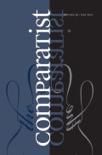
Comparatist
Cultivating Intellectual Exchange in Comparative StudiesComparatist is a distinguished journal published by the University of North Carolina Press, focusing on the interdisciplinary exploration of comparative literature, culture, and critical theory. With its ISSN 0195-7678 and E-ISSN 1559-0887, this journal serves as an essential platform for scholars and practitioners to engage with diverse literary traditions and foster dialogues across cultural boundaries. Targeted at researchers, professionals, and students, Comparatist publishes original research articles, critical essays, and theoretical perspectives that contribute significantly to the understanding of comparative studies in literature. The journal is committed to advancing the field by offering fresh insights and fostering intellectual exchange among a global audience. Although it currently does not offer Open Access options, Comparatist maintains a robust reputation within its discipline, making it an invaluable resource for those seeking to deepen their understanding of comparative methodologies and literary discourse.

Anclajes
Empowering Voices in Literature and LinguisticsAnclajes is a prominent academic journal dedicated to the fields of Cultural Studies, Linguistics, and Literature, published by the UNIV NACIONAL LA PAMPA, FAC CIENCIAS HUMANAS. With both print (ISSN 0329-3807) and electronic (E-ISSN 1851-4669) formats, the journal has embraced an Open Access model since 2010, greatly enhancing its accessibility and reach to a global audience. Based in Argentina, Anclajes provides a platform for innovative research and critical discourse, contributing significantly to the understanding of cultural phenomena and literary theories. In recent years, the journal has established itself with a Scopus rank placing it in the top 30% of Literature and Literary Theory and the top 57% of Cultural Studies, as indicated by its quartile rankings for 2023. With issues converging from 2012 to 2024, Anclajes continues to foster scholarly communication and serves as an essential resource for researchers, students, and professionals seeking to explore the dynamism of human culture and expression.